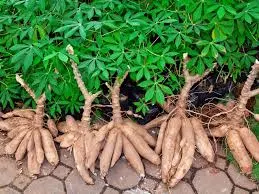November 05, 2021
0
According to report monitored by Prudentj2, PIND has invested about $ 800,000 to increase the production of cassava, strengthen the integration and relationship of the actors of the cassava value chain, which includes the development of cassava production technology in the Niger Delta.
"Through this, we have successfully reached approximately 300,000 farmers with knowledge and training, and have helped create nearly 2,500 jobs and a network of 150 service providers," said Mr Akala.
Mr Akala said large cassava processors needed a reliable, healthy and timely supply of new cassava roots to feed their mills regularly, but noted that Nigerian farmers were unable to deliver the required quantity and quality of cassava roots needed on time, resulting in low cassava roots. production, slow use of turnkey processing equipment and subsequent financial losses.
He said experts had reported that the integration of highly productive, virus-free, mechanical systems and good agricultural practices, including six measures to control weeds, could be a global change in root delivery.
The Director at IITA, Dr Alfred Dixon, said it was unfortunate that Africa was spending an estimated $ 35 billion a year on food imports.
"The risk is that if we do nothing about it, food imports will rise to $ 110 billion by 2025, and if this happens, our trade, and especially exchange rates, will be in jeopardy,"
Mr Dixon said.“We will export jobs and impoverish poverty, unemployment will increase and the level of youth disobedience will be higher.
The impact will be detrimental to the food and food security of the continent. It's time to dump her and move on. ”
TAGS
* Please Don't Spam Here. All the Comments are Reviewed by Admin.
Top Post Ad
Looking For a Remote Job That Pays in Dollars?
Many Nigerians are now earning in USD from home. Do not miss out on these legit remote job opportunities that pay in dollars.
✅ View List of Remote Jobs Paying in USD(Tap to open and start earning in dollars)
Below Post Ad
👉 GET YOUR OPay Android POS MACHINE TODAY!

We are PRUDENTJ2, an official Opay Aggregator fully licensed to distribute
Opay Android POS Machines nationwide at the rate of ₦31,200 only.
PRUDENTJ2.COM is a trusted finance platform in partnership with Opay, with active presence across all major social media platforms.
Please note clearly: there is now a required transaction target. Every merchant is expected to carry out a minimum transaction volume of ₦500,000 every week.
This does not mean pressure or harassment. It simply means the POS machine must be used for genuine business. Buying the POS and keeping it at home without usage is not acceptable.
Opay has given us the licence to manage our merchants, so you can be confident that everything is properly monitored and supported.
Once you receive your POS, you will be added to our official WhatsApp support group, where you can meet other merchants, ask questions, and report any issues for immediate assistance.
REQUIREMENTS:
- Download the Opay Business App.
- Log in or create an account if you do not have an Opay account.
- Upgrade your account to Merchant Level.
Learn how to upgrade your Opay Business Account to Merchant level here:
Click to read the full guide
After upgrading to merchant level, we will send your POS machine to you immediately. You are free to ask questions anytime.
📞 WhatsApp or Call: 07025557344
🚚 Nationwide Delivery within 48 Hours
🏠 Based in Anambra, Delta, Imo, and Abia States
PAYMENT ON DELIVERY! (Payment is deducted from your Opay account during POS activation)
Ads Section
👉 GET YOUR OPay Android POS MACHINE TODAY!

We are PRUDENTJ2, an official Opay Aggregator fully licensed to distribute
Opay Android POS Machines nationwide at the rate of ₦31,200 only.
PRUDENTJ2.COM is a trusted finance platform in partnership with Opay, with active presence across all major social media platforms.
Please note clearly: there is now a required transaction target. Every merchant is expected to carry out a minimum transaction volume of ₦500,000 every week.
This does not mean pressure or harassment. It simply means the POS machine must be used for genuine business. Buying the POS and keeping it at home without usage is not acceptable.
Opay has given us the licence to manage our merchants, so you can be confident that everything is properly monitored and supported.
Once you receive your POS, you will be added to our official WhatsApp support group, where you can meet other merchants, ask questions, and report any issues for immediate assistance.
REQUIREMENTS:
- Download the Opay Business App.
- Log in or create an account if you do not have an Opay account.
- Upgrade your account to Merchant Level.
Learn how to upgrade your Opay Business Account to Merchant level here:
Click to read the full guide
After upgrading to merchant level, we will send your POS machine to you immediately. You are free to ask questions anytime.
📞 WhatsApp or Call: 07025557344
🚚 Nationwide Delivery within 48 Hours
🏠 Based in Anambra, Delta, Imo, and Abia States
PAYMENT ON DELIVERY! (Payment is deducted from your Opay account during POS activation)
Featured post
Advertisement
RECENT POST
10/sgrid/recent
Follow Prudentj2
Footer Copyright
PRUDENTJ2 is a prudent and international blog/website that focuses on giving out or disseminating Educative and Essential information on 📍 Inspiring, Emotional & Faith-filled Stories Every Day 🌍. which helps you to know what is happening in the world and at end, Provide solutions to your problems, Change and improve your thoughts and standard of living both materially, academically, financially, spiritually and otherwise. If You have questions about our . don't hesitate to contact us on prudentj2@gmail.com. Thank you
Copyright@ PRUDENTJ2 2025
-Picsart-AiImageEnhancer.jpeg.png)

